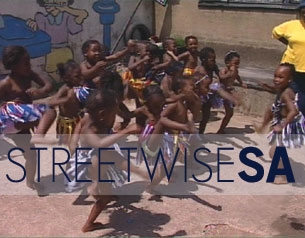South Africa - Streetwise S A
Whatever happened to the comrades of Soweto? Have they actually benefited from the changes they helped bring about? This documentary goes to the heart of South Africa's township dilemma.
 Whatever happened to the comrades of Soweto? Have they actually benefited from the changes they helped bring about? This week's beautifully filmed documentary takes you straight into their world. It's a world of gangs, violence and crime - where the police are too scared to patrol the streets and the early optimism has been replaced by despair. Made by renowned filmmaker Marion Mayer-Hohdahl and interspersed with poignant archive, this film provides a fresh look at the generation left behind.
Whatever happened to the comrades of Soweto? Have they actually benefited from the changes they helped bring about? This week's beautifully filmed documentary takes you straight into their world. It's a world of gangs, violence and crime - where the police are too scared to patrol the streets and the early optimism has been replaced by despair. Made by renowned filmmaker Marion Mayer-Hohdahl and interspersed with poignant archive, this film provides a fresh look at the generation left behind.
From inside the security of a tank, white soldiers fire on a crowd of unarmed protestors. The crowd scatters, stopping only to drag the wounded away from the oncoming soldiers. Even children are shot at. During the 1970s, Soweto was the scene of some of the worst anti-apartheid violence. "People were not allowed to be on the streets at night," recalls former journalist Martin Mamlaba. "The army would beat them up, the police would beat them up. They didn't want gatherings of more than five people." Encouraged by the violence and brutal methods of their comrades, the township united in the fight against oppression.
Now the generation which fought apartheid has been defined by their violent past and abandoned by the government they helped install. With no education or formal training they have no skills to offer the new South Africa. "These people have no jobs and have to steal. People are being killed because of this," despairs one resident. Their only option is to seek refuge in crime and drugs. Gangs have flourished and law and order has broken down.
In today's South Africa, everything is theoretically possible. Black people can live in the white suburbs of Johannesburg and townships like Soweto are open to white residents. But the only whites to visit Soweto are tourists. Enforced segregation has been replaced by voluntary apartheid.
And when young Africans do go to the white districts, it's often to steal. In a district of Johannesburg, Carabo and Freddy demonstrate how they earn their money. With military-like precision, they ambush a driver and steal his car. They do this every day. But there is one man prepared to take on the gangs the police avoid - Bishop Ananias Maredi. And his methods are anything but conventional. "The bishop came and he beat me. He talked to me and explained that if I stayed a gangster I would have no future."
But the gangsters do not take kindly to Bishop Maredi's perceived meddling and target him and his converted youths. "They're forcing me to take the law into my hands," he warns. "Now what I'm going to do, if they continue, is beat them to death because our police do nothing." Even the police admit that the criminal justice system in South Africa has been overwhelmed by the sheer number of crimes committed.
For most of these young outcasts, their own sense of self worth comes from committing crimes. "The more evil they become the more they accept it. They become like heroes amongst themselves," states social worker John Pass sadly. An hour and a half from Cape Town is a special camp providing a way out for the most fortunate. Youngsters here are trained in a skill or given an education. In the five years since their programme began, they've helped reform many former gangsters. "Before I didn't have a future because I had done so many things," describes 20 year old Nicholas. "But now, I'm beginning a new life."
South Africa's biggest challenge lies in persuading these youths that there is something beyond crime and violence.
FULL SYNOPSIS
